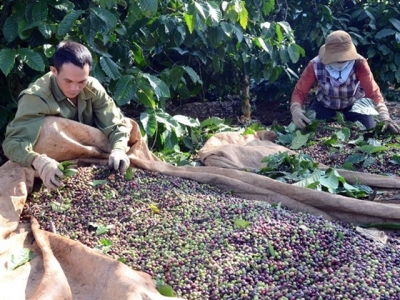Technology can raise quality of agricultural products

Farmers in Đắk Nông District harvest coffee. Technological applications are needed to improve the quality and scale of Việt Nam’s agriculture sector. — VNA/VNS Photo Hưng Thịnh
HÀ NỘI — New technologies are key to advancing the agriculture sector in Việt Nam, as they can boost products’ value to make them more competitive on the global market.
Experts and specialists told a Vietnam Economic Forum conference yesterday that advanced technologies, including blockchain, could help companies, organisations and households in the agricultural sector raise productivity, save costs and create higher quality products.
Nguyễn Quốc Toàn, acting director of Agricultural Market Processing and Development, said Việt Nam has high potential to develop its agriculture sector. The country has exported to 180 markets worldwide. Of all products, vegetable exports reached US$1.5 billion in 2016 from $105 million in 2003 and are expected to touch $3.5 billion this year.
The application of technologies in the sector is needed as the market has shown rising demand for clean products with traceable origins.
According to Terry Chan, chairman of Hong Kong E-commerce Supply Chain Association (HKeCSC), blockchain technologies should be deployed as much as possible in agriculture to connect Vietnamese products to the world market.
As e-commerce is developing rapidly and new trading platforms are used across the world, agricultural outputs must meet customers’ demands and ensure the quality of the whole production chain, he said.
The Vietnamese agricultural sector is trying to integrate into the world’s market, but it has encountered some challenges regarding product quality, supply chains and transparency of the product, Chan said.
The sector should propose the Government allow advanced technologies to be applied to resolve existing issues and make safe, high-quality, standardised and traceable products, Vũ Trường Ca, chairman of the management board of Lina Network, said.
Though the Government has been giving strong support to the agriculture sector and has issued policies to help farmers, the sector has yet to meet the market requirements, he said.
“Blockchain technology is strong enough to change the world in the future. It is currently in the early stages, similar to the internet 25 years ago, so Việt Nam is capable of exploiting this technology and applying it in the agriculture sector,” Ca said.
According to Ca, Việt Nam has big advantages in mathematics and technology, proven by its high rankings in international math competitions. As the whole world has the same starting point in this technology, Việt Nam could take the lead.
Đào Ngọc Chiến, deputy director of High Technology Department under the Ministry of Science and Technology, said that the ministry would accompany businesses in this issue.
He said his department is drafting a development plan and submitting it to the ministry this month. The draft plan contains four topics: evaluation of the fourth industrial revolution and its impacts in some key sectors, and key technological applications for economic industries.
Dairy maker TH Group is a typical example of successfully using high-tech applications in businesses, said Võ Văn Quang, deputy general director of Bac A Joint Stock Commercial Bank (Bac A Bank)
He said that the bank in 2009 started funding dairy maker TH Group to develop cattle farms. However, TH Group was able to apply Israeli technologies for cattle raising, from grass development to attaching chips to cows to keep track of cattle’s health and productivity. Thus the dairy producer’s outputs meet standards in domestic and overseas markets.
Có thể bạn quan tâm
 Mekong Delta islet gives up rice, switches to soursop
Mekong Delta islet gives up rice, switches to soursop More farmers in Tiền Giang Province’s Tân Phú Đông Islet have switched to soursop in coping with the adverse effects of climate change.
 Cashew exports hit over 1.3 billion USD in first five months
Cashew exports hit over 1.3 billion USD in first five months Vietnam exported 141,000 tonnes of cashew in the first five months of 2018, raking in more than 1.39 billion USD
 Hà Nam to witness high-tech agricultural products
Hà Nam to witness high-tech agricultural products High-tech agricultural products and technologies at a fair themed, “High-tech and safe agricultural products in the Red River Delta Region in 2018.”